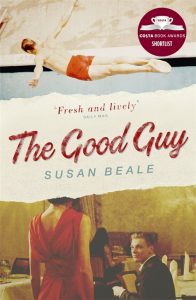The Good Guy (Shortlisted, 2016 Costa First Novel Award)
 It is human nature to be attracted to that which we feel we can relate to, things that resonate within us. And perhaps that is why as a debut novel, The Good Guy, is such a memorable first impression. Inspired by her own experience, Susan Beale offers a compelling insight into the classic tale: the darker side of the suburban white picket fence.
It is human nature to be attracted to that which we feel we can relate to, things that resonate within us. And perhaps that is why as a debut novel, The Good Guy, is such a memorable first impression. Inspired by her own experience, Susan Beale offers a compelling insight into the classic tale: the darker side of the suburban white picket fence.
Although the subject matter and plot line are not in themselves novel, following the tropes of the destructive influence of adultery on a superficially happy family, what makes Beale’s writing so poignant is her ability to paint her characters with such acute attention to detail. Her intimate understanding of the way people rationalise their behaviour under the stresses of married (and dating) life highlights how easy it is to slip into miscommunication, particularly in regard to self-reflection and honesty, and equally as frighteningly, the capacity of two people living intimately together to be almost completely unaware of each other.
With each chapter covering the perspective of one of the three central characters, the reader is allowed to piece together their various experiences to create the story that exists somewhere outside of all of their individual minds. Indeed, one of the main points of this novel is to emphasise the importance of perspective in life and how its skewing can lead to social deterioration. One of the book’s central themes then: the dangers of self-delusion.
Ted, the main instigator of movement through the story, is “the good guy”: he embodies the typical soul lost to the American Dream as his initially innocent ambitions surpass the potential of his current circumstances, and extend into a fantasy that leads him astray. Through him, Beale explores how affairs are justified and rationalised with ease even though they can cause heartbreak on two fronts. Meanwhile his wife, Abigail, has her own take on the struggles of the ambitious mother who doesn’t fit traditional motherhood ideals; between active suppression and passive submission, she lets the things she loves pass her by in hope of achieving a more socially acceptable image as a mother and wife.
The frankness with which Beale covers these issues is grounding; perhaps it is her intimacy with the subject that creates such an empathetic and honest relationship with the reader. And although The Good Guy seems an awfully sarcastic title as regards the events that unfold in the novel, in the end, we are reminded of our own humanity. We are all equally subject to the struggle of doing our best where ends don’t always meet, finding that what we want and what we have is not always the same thing, or even capable of co-existing. Ted’s dreams may eventually destroy him and taint the lives around him, yet consolation comes as his wife and lover both earn a cathartic redemption despite their own shortcomings. It is the novel’s development of these themes – the resilience of individuals, a recognition of how vulnerable we are in our own lives – that rejuvenates the classic suburban tale.
Kat Chadbourn

Leave a Reply